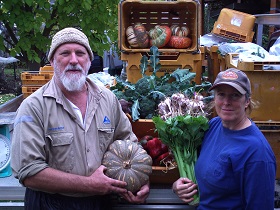Anton and Fiona Bombara are seasoned organic growers.
Their organic market garden business in the Peel region of Western Australia has flourished from a part-time enterprise growing only watermelon, tomatoes and capsicum to a full-time business employing four additional staff and producing a wide range of summer and winter crops.
The Bombara's are 'idealists' and started with organics because they wanted to be able to produce better quality food in a way which wasn’t destructive to the land.
From an initial background as a gardener, Anton learnt horticultural skills on the job and read extensively to find out all about organics and its application from backyard to commercial.

The heart of organics is the soil and feeding the soil so all of the nutrients the plants need are available.
The Bombara’s established their first certified organic market garden in West Serpentine during 1989 and subsequent gardens in Keysbrook and Pinjarra, Western Australia before commencing their Hamel business in 1995.
Accreditation
Fiona said that becoming accredited as organic is a lengthy process, requiring land use activities for the past three years to be documented.
"The organic accreditation process looks at everything from your seeds, seedlings, planting and fertiliser process to harvesting, packing and transporting."
Hamel Homegrown Organics are accredited with the National Association for Sustainable Agriculture Australia (NASSA), who are in turn certified with the International Federation of Organic Agriculture Movements (IFOAM) based in Europe.
Getting inputs right
Healthy soil is an essential part of any farming system. Fiona said that in organics, careful use of external inputs is essential.
"Typical to south-west soils, we had an initial soil health problem.
"Increasing the biological activity in our soils by using fulvic and humic acid, green manures and working the soil to expose it to air and light we were able to overcome this problem and we now have healthy productive soils.
“Our inputs, in terms of fertiliser, are based around the theory of Dr William Albrecht, a US soil scholar.'"
"Dr Albrecht believes soil calcium and magnesium levels are the key to good production.
"We have our soils tested every two years and this determines what nutrients we add to the soil.
"We started soil testing about 10 years ago and by using the test results to guide our fertiliser decisions we were able to significantly improve our yields within 12 months.
"Our soil here is loam with heavy clay so it is hard to manage — but it is much more manageable now, " Fiona said.
At their Hamel property all irrigation is carried out via t-tapes.
"After mastering the skill of flood irrigation we were very pleased when Harvey Water installed a new piped, pressurised system.
"This saves a lot of wastage incurred with flood irrigation and we have water where and when we want it," she said.



